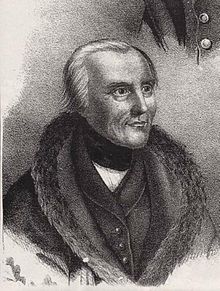Hans Christoph Ernst von Gagern
This article relies largely or entirely on a single source. (December 2008) |

Hans Christoph Ernst Freiherr von Gagern (25 January 1766 – 22 October 1852),
He was afterwards appointed the prince's
He then retired to
In 1815 he represented him at the
Of his sons, Heinrich von Gagern and Max von Gagern also became politicians, and Friedrich Balduin von Gagern became a soldier.[2]
Works
Gagern wrote a history of the German nation (Vienna, 1813; 2nd ed., 2 vols., Frankfort, 1825–1826), and several other books on subjects connected with history and social and political science. Of most permanent value, however, is his autobiography, Mein Anteil an der Politik, 5 vols. (Stuttgart and Leipzig, 1823–1845).[1]
Notes
Regarding personal names: Freiherr is a former title (translated as Baron). In Germany since 1919, it forms part of family names. The feminine forms are Freifrau and Freiin.
References
- ^ a b c d e One or more of the preceding sentences incorporates text from a publication now in the public domain: Chisholm, Hugh, ed. (1911). "Gagern, Hans Christoph Ernst, Baron von". Encyclopædia Britannica. Vol. 11 (11th ed.). Cambridge University Press. p. 386.
- ^ Chisholm 1911.
